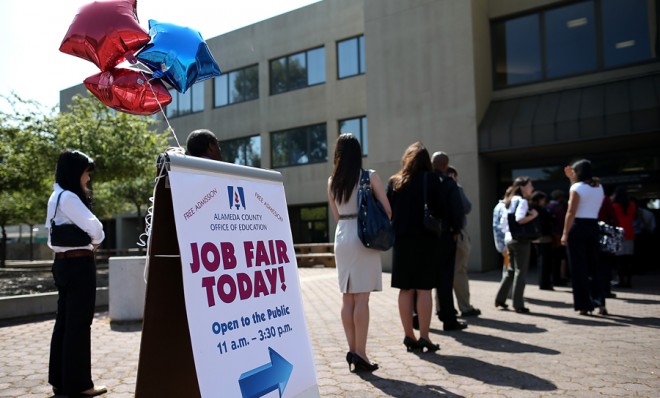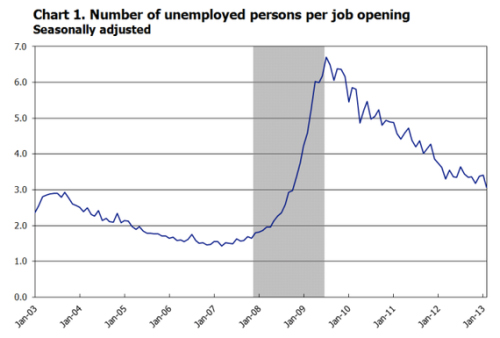Unemployment isn't voluntary
There are still about 3 unemployed people for every 1 job opening in America

A free daily email with the biggest news stories of the day – and the best features from TheWeek.com
You are now subscribed
Your newsletter sign-up was successful
Aid to the unemployed in the United States is about to be chopped.
Of the sequester's more than $80 billion in across-the-board spending cuts that were enacted in the spring, about $2.4 billion is being cut from the federal emergency unemployment benefits program. According to the National Law Employment Project, more than 3.8 million unemployed workers will be affected. The average weekly benefit check of $289 will be cut by $43 — a 16 percent decrease.
Why are benefits being reduced so steeply? Paul Krugman says that it's because politicians — particularly conservative politicians — believe that unemployed people are lazy, and that unemployment benefits have lulled them into a life of idleness. In a recent column he wrote:
The Week
Escape your echo chamber. Get the facts behind the news, plus analysis from multiple perspectives.

Sign up for The Week's Free Newsletters
From our morning news briefing to a weekly Good News Newsletter, get the best of The Week delivered directly to your inbox.
From our morning news briefing to a weekly Good News Newsletter, get the best of The Week delivered directly to your inbox.
In general, modern conservatives believe that our national character is being sapped by social programs that, in the memorable words of Paul Ryan, the chairman of the House Budget Committee, "turn the safety net into a hammock that lulls able-bodied people to lives of dependency and complacency." More specifically, they believe that unemployment insurance encourages jobless workers to stay unemployed, rather than taking available jobs. [New York Times]
The idea that unemployment is the fault or the choice of the unemployed is not without support from some economists. Robert Lucas winner of the 1995 Nobel prize, once noted, "The unemployed worker at any time can always find some job at once."
Is that true?
The evidence says no. Although there are fewer unemployed people per job opening than there were immediately after the recession, there are still fewer jobs than job seekers on the market:

Though one could argue that unemployed people could become employed without filling an advertised job opening by simply starting a business, with 76 percent of Americans living paycheck-to-paycheck and credit conditions still extremely tight, accessing the capital required to start a business is not an option for the majority of the unemployed.
A free daily email with the biggest news stories of the day – and the best features from TheWeek.com
While cutting unemployment benefits may work at making the unemployed more desperate than ever to find work, no matter how desperate they become, there simply isn't enough demand for labor in the economy to absorb the unemployed.
And if those workers who have given up their job hunts and dropped out of the labor force return to looking for work, they will drive the unemployment-to-job-openings ratio yet higher, putting even more pressure on workers to find jobs that simply aren't there.
Solving the challenge of high unemployment is not a matter of job-seekers working harder to look for work. It's a matter of the economy being able to create enough jobs and demand to absorb job-seekers.
Trying to nudge unemployed people into looking harder for work seems like a futile exercise. If the government wants to get people off unemployment, the only real option is job creation.
John Aziz is the economics and business correspondent at TheWeek.com. He is also an associate editor at Pieria.co.uk. Previously his work has appeared on Business Insider, Zero Hedge, and Noahpinion.
-
 How the FCC’s ‘equal time’ rule works
How the FCC’s ‘equal time’ rule worksIn the Spotlight The law is at the heart of the Colbert-CBS conflict
-
 What is the endgame in the DHS shutdown?
What is the endgame in the DHS shutdown?Today’s Big Question Democrats want to rein in ICE’s immigration crackdown
-
 ‘Poor time management isn’t just an inconvenience’
‘Poor time management isn’t just an inconvenience’Instant Opinion Opinion, comment and editorials of the day